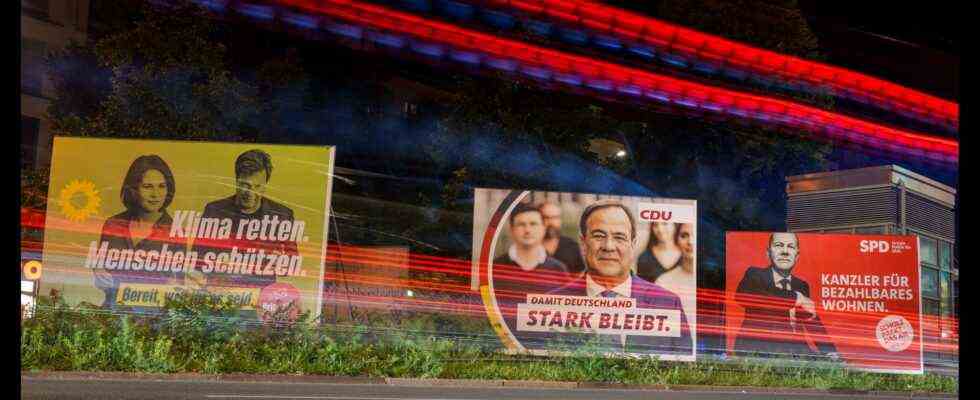analysis
Status: 02.09.2021 13:56
A Union in the downward trend, an SPD in the upward trend – and the Greens are still somehow involved: In sight of the Bundestag election, the roles have been redistributed. That has consequences.
Month after month the polls showed a depressing picture for the German social democracy. The black bar from the CDU / CSU clearly exceeded the red SPD bar. But suddenly the tide turned. In the end there was a triumph for the SPD. This is what happened in 2002. Gerhard Schröder was able to stay in the head office of the Chancellery after the federal election.
A good 20 years later, Olaf Scholz could also make a successful comeback. in the ARD Germany trend from August, his SPD was still very thin behind the Union. But the tendency of the past few months is clear: SPD up, Union down. In some surveys, the lines have already crossed. Opinion polls are snapshots, not forecasts. But the figures currently reflect a development that is causing the Union great concern. Must prepare.
First lukewarm, now hot?
The roles are redistributed less than four weeks before election day. The long-knocked-off Vice Chancellor Scholz is now considered a favorite by many. CDU man Armin Laschet has to stop the sustained downward trend so that there is no greater unrest in his own ranks. And the Greens, which were still shining in the spring, want to prevent the three-way battle for the Chancellery from turning into a final duel – with them on the sidelines.
So far, the struggle for the Chancellery has been lukewarm at best. Actually surprising: With the declared departure of Angela Merkel, an era of 16 years ends. The tasks that a new federal government will face are gigantic: counteracting climate change, finally noticeably advancing digitization in Germany, cushioning the social hardships of the pandemic. Special times. And yet the controversy over the best content-related plans did not dominate the election campaign for a long time. CV corrections, a little carefully written book or a misplaced fit of laughter made the headlines.
The SPD – it moves
After all: The temperature in the dispute is rising, so that the “hot phase” of the election campaign can slowly earn its name. Baerbock, Laschet and Scholz tour the republic with their election programs. The largest stages offer the various TV formats, where the three can present themselves to an audience of millions. What are the differences in content? There can be direct arguments about the tax concept and climate targets. And even the topic of foreign policy, which is otherwise unsuitable for election campaigns, is moving more into focus after the Afghanistan disaster.
The aggressiveness is very unevenly distributed, which was also shown in the first triad of the RTL station. Scholz remains in the more passive corner. Although he had been able to increase his personal popularity ratings in the polls over a longer period of time, at the same time his own party seemed to cling to him like lead.
But unlike Laschet and Baerbock, Scholz has not made any mistakes so far. And meanwhile even the SPD values are climbing. The party’s election campaign is fully tailored to Scholz. And he pretends to be the governing crisis manager. Is it a recipe for success? “The leading candidate is so boring that people compare him to a machine,” writes Katrin Bennold, Berlin correspondent for the New York Times, in her analysis of the German election campaign, quoting Oxford professor Timothy Garton Ash: ” There are few countries where boring is so rewarded. “
The original speaks up
CSU boss Markus Söder accuses the Vice Chancellor of “legacy sneaking”. The Vice Chancellor had himself photographed with a Merkel diamond for the magazine of the “Süddeutsche Zeitung”. That was too much even for the original. Merkel had actually wanted to hold back in the election campaign. But now, when asked about Scholz at a press conference, she spoke of a “huge difference between him and me”. With her there will be no coalition with the Left Party. By contrast, Scholz lacks a clear statement.
Suddenly slacks off in an unusually attacking way
That was exactly Laschet’s line of attack in the latest TV triall: Scholz should finally rule out a coalition with the left. Laschet was unusually attacking – the man who otherwise likes to be integrated and moderating. A role change for him too. However, it is not clear whether the warning of a left alliance will pay off. At least it could help to score points with the regular electorate.
Whether a laschet in attack mode can stop the downward trend could be the new one GermanyTrend show, which will be released today at 6 p.m. Accordingly, the Union should look closely at the numbers: in the Berlin Adenauer House, in the NRW State Chancellery but also in Munich.
Green-in-between high-winged dreams
And then there are the Greens. If you look at their values in the Sunday question over the past few years, the Greens could actually pat their shoulders with satisfaction. Values around 20 percent are an enormous success for what is currently the smallest opposition party in the Bundestag. Actually. If it weren’t for the interim high in spring. The Union in the power struggle, the Greens united on the outside. That gave wings to dreams of the green “Chancellor’s Office”. Mistakes of my own followed and the polls crashed. In the triell, Baerbock also relied on attack and made it clear that she could continue to be expected.
Much is still possible in the weeks remaining before election day. The gaps between the parties of Scholz, Laschet and Baerbock are manageable compared to the apparently defeated Schröder-SPD 2002. The race continues – only with newly assigned roles.

